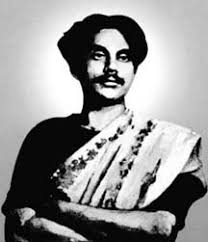Kazi Nazrul Islam (p2)

A CALL FROM BEHIND
Dear! Wilt thou remember me in thy new home?
There dost thou begin the world under
new auspices with new offerings
Deserted is now the leafy cottage; its
shady neighborhood where we two
first exchanged our looks, where
every particle of dust, every.
creeper and leaf is redolent
of the wealth of eternal acquaintance
in the worship of hearts,
And a dismal void now cries in the wilderness.
As didst thou forget me, many a man could
come to thee,
Then out of sympathy for me would that
cottage weep out an offended heart,
Wherever dist thou turn thy eyes,
my reminiscences there made thy heart ache,
Thou wilt drown that reproach here
in the depths of new field;
I alone am lost in the woods’ of oblivion.
The distance between thee and me was so
long no real distance,
As that old mansion would bring my
distance into nearness.
Now hast thou formed new ties,
Opened a new fountain of laughter and tears,
New performance and new revelry of song,
Under the impulse of new welcome!
To the cold storage my own tune is consigned.
Dear! Mine is today forlorn hope, as
pre-ordained by the divinity,
Today on my grave will be built thy bridal
sanctum sanatorium
In the air is echoed and re-echoed
The music of the Sylvan flute in the mouth
of some cow-herd,
Lost, lost am I in the western horizon!
Farewell, Dear, our role comes to an end
with the setting sun,
Now art thou a new one in a new home!
[Translation: Abdul Hakim]
Kazi Nazrul Islam
The Rebel Poet of Bengal
The National Poet of Bangladesh and more truly a World Poet.
“Raise your head high, for you are a child of the sun, and the sun never sets.”
“I am a poet of love, of the eternal love between mother and child, between lover and beloved.”
“I am not a poet of the elite; I am a poet of the masses.”

Early Years
Kazi Nazrul Islam was born on May 24, 1899, in Churulia village, Bardhaman, West Bengal, India. He was the son of Zaheda Khatun and Kazi Fakir Ahmed, the Imam of the local mosque. As the second of four siblings—three sons and one daughter—Nazrul faced significant adversity early in life, losing his father at the tender age of nine in 1908, when his father was just 60 years old. Nazrul earned the nickname “Dukhu Mia” (hapless chap), that poignantly captures the hardships and struggles he endured from a young age. Following his father’s untimely death, he became the Muazzin (caller to prayer) of the local mosque at the age of ten. This early exposure to the tenets and practices of Islam would profoundly influence his subsequent literary work.
In 1910, his headmaster remembers him being a handsome, yet shy boy at the age of 11 years. But due to financial strains at school to take up a job at a bakery and teashop in Asansole as a chef.
Nazrul became a member of a folk-opera group, inspired by his uncle Bazle Karim, who was renowned for his compositions in Arabic, Persian, and Urdu. Within this folk-opera ensemble, the young Nazrul not only showcased his talent as a performer but also began to create his own poems and songs. His engagement with the group played a significant role in shaping his literary journey.



